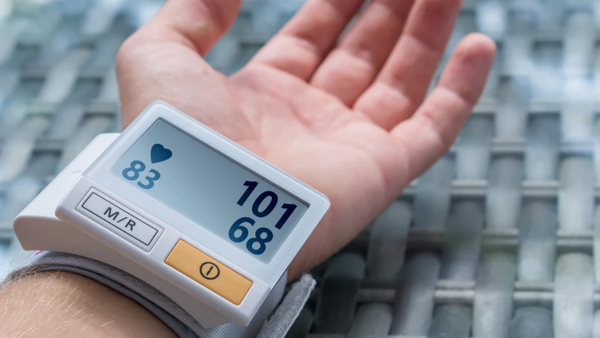Eyelid twitching , night-time calf cramps and inner restlessness are typical symptoms of a magnesium deficiency. Magnesium is a vital mineral that is unfortunately often lacking in the diet.
Here you will learn why magnesium is so important, how to recognize a deficiency and how you can meet your needs.
At the end of the article we have a small gift for you. It's worth reading on!
Why is magnesium important?
Magnesium is an essential mineral that we cannot produce ourselves and therefore must obtain through food.
The mineral plays a central role in metabolism as it is involved in over 300 enzymatic reactions . Without magnesium, many of the processes that are essential for cell function cannot take place.
Magnesium is particularly important for muscle and nerve function and for maintaining bones . [1]

The European Food Safety Authority confirms the followingeffect of magnesium in its Health Claims Regulation:
It carries
- to a normal energy metabolism in
- to normal psychological function in
- to reduce tiredness and fatigue in
- to normal muscle function in
- to maintain normal bones in
- to maintain normal teeth in
- to normal functioning of the nervous system in
- to normal protein synthesis in
- to electrolyte balance in
Magnesium daily requirement
According to the German Nutrition Society (DGE), the daily magnesium requirement for adults is 300 – 400 mg, depending on age and gender. [2] Under the age of 25, the requirement is slightly higher and men have a higher requirement than women. Pregnant and breastfeeding women also have a slightly higher requirement.
However, these are only average values. Your individual needs also depend on how much stress you are under and how much sport you do. Certain illnesses, such as gastrointestinal diseases and kidney problems, can also increase your needs.
Unfortunately, most Germans do not havean optimal magnesium supply . Women consume an average of 200 mg per day, men 250 mg . [3] Therefore, magnesium deficiency is widespread .

Symptoms: How to recognize a magnesium deficiency
A magnesium deficiency can cause the following symptoms: [4]
- Muscle tension and twitching
- Muscle cramps, typically in the calves
- Eyelid twitching
- fatigue
- Sleep problems
- slight irritability and nervousness
- high sensitivity to stress
- Cardiac arrhythmias and heart palpitations
Foods with magnesium
Nuts, seeds, green leafy vegetables and fish are rich in magnesium. The table shows the content of the best magnesium sources: [5]
|
Groceries |
Magnesium content (mg/100g) |
|
Pumpkin seeds |
535 |
|
cocoa |
499 |
|
linseed |
392 |
|
Brazil nuts |
376 |
|
sesame |
351 |
|
Sunflower seeds |
325 |
|
Peanuts |
188 |
|
Swiss chard |
81 |
|
spinach |
79 |
|
Halibut |
83 |
Buy Magnesium
If you have a magnesium deficiency, it can be a good idea to compensate for the deficit with a magnesium supplement. There are many different products available when it comes to dietary supplements , with large differences in quality.
Magnesium is also available in many forms, such as powder,capsules , effervescent tablets and chewable tablets . It is especially important that you pay attention to the ingredients and which magnesium compounds the preparation contains (see below). You should avoid unnecessary artificial additives if possible.
Laboratory analyses
One of the most important quality criteria is origin . Germany and other EU countries place very high demands on manufacturers of food supplements. In Germany, the products must also be regularly analyzed by independent laboratories to ensure consistent quality.
Different types of magnesium
Magnesium is a positively charged molecule (Mg 2+ ) that is very reactive. For this reason, it is always present in combination with other molecules. A distinction is made between organic and inorganic magnesium compounds . Organic magnesium is more soluble than inorganic magnesium and therefore has a higher bioavailability. [6]
Organic compounds include:
- Magnesium citrate
- Magnesium Glycinate
- Magnesium gluconate
- Magnesium aspartate
Inorganic compounds include:
- Magnesium sulfate
- Magnesium oxide
- Magnesium chloride
- Magnesium carbonate
dosage
The daily requirement of magnesium is 300-400 mg . When taking dietary supplements, you should remember that you also consume magnesium through food.
If you have a magnesium deficiency, a higher dose is necessary than if you supplement your daily intake with a magnesium supplement to prevent a deficiency.
It is therefore important that the magnesium preparation is easy to dose.
Tri-Magnesium Dicitrate from Viktilabs
Themagnesium preparation from Viktilabs is tri-magnesium dicitrate. It is characterized by the following features:
- organic magnesium citrate with high bioavailability
- Tri-Magnesium Citrate has a higher magnesium content than other magnesium citrates
- without artificial additives
- Developed in Germany
- 100% vegan
- easy to dose : 4 capsules provide 300 mg magnesium
Conclusion: Magnesium is often neglected in the diet
Magnesium is a vital mineral that plays a central role in metabolism and is important for bones, nerves and muscles.
Many people do not consume sufficient amounts of magnesium through their diet, which can lead to deficiency symptoms. Ahigh-quality magnesium supplement can help to compensate for or prevent a deficiency.
We at +Viktilabs have provided you with a 15 % voucher on our magnesium and hope that this will bring you joy.
Simply copy the voucher code " MAGNESIUM+V15 " and enter it at checkout.
Click here for the product
_____________________________________________________________________
[1] https://www.ncbi.nlm.nih.gov/pmc/articles/PMC4455825/
[2] https://www.dge.de/forschung/referenzwerte/magnesium/
[3] https://www.kup.at/kup/pdf/1046.pdf
[4] https://www.ncbi.nlm.nih.gov/pmc/articles/PMC5786912/
[5] https://nutritiondata.self.com/foods-000120000000000000000-1w.html ?


















